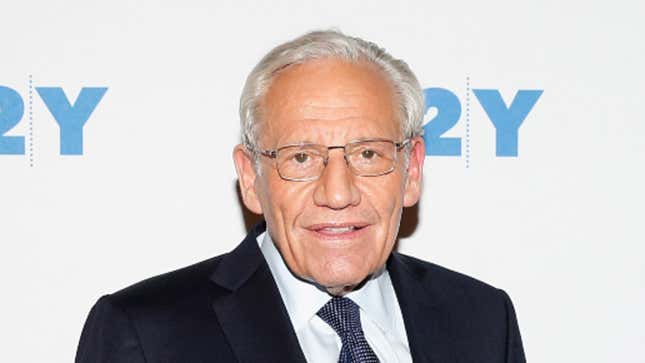On Wednesday night, veteran journalist Bob Woodward moderated an event in Washington, D.C., featuring New York Times reporters Jodi Kantor and Megan Twohey on their new book She Said: Breaking the Sexual Harassment Story That Helped Ignite a Movement. Their thorough and remarkable reporting on Harvey Weinstein and the women who came forward about his abuse and harassment
are widely credited for helping to kickstart a national reckoning with sexual violence, and it would be reasonable to assume that this would be an event in which two of the best investigative reporters working today would share with another celebrated reporter how they approached the story. Yet Woodward, according to accounts from people who attended the event, seemed more interested in hearing himself talk and repeating tired ideas about sexual violence.
At another point, after Kantor and Twohey said that sexual harassment is about power, he doubled down on his point, asking: “So it’s about power? It’s about sex also though, isn’t it?” Woodward then moved on to discuss Christine Blasey Ford’s allegations against now-Supreme Court Justice Brett Kavanaugh, and, according to Swirling, asked them skeptically “whether they would have deemed Dr. Ford’s story, despite its ‘imprecision,’ credible enough” to report.
Woodward’s line of questioning—one which casts the credibility of women in doubt—is a classic one, and it’s hard to not read his comments and questions as an attempt to both undermine Kantor and Twohey’s impressive reporting as well as the severity of sexual harassment and assault. The audience was not having it, booing Woodward and, according to Kira Lerner, a reporter at criminal justice site the Appeal, some attendees walked out of the event.
Color me completely unsurprised that Woodward, who is not exactly known for taking sexual and physical abuse against women seriously, completely missed the mark in this interview. In his own recent book Fear, released at the end of 2018, he notedly glossed over the allegations of domestic abuse levied against former White House aide Rob Porter by two of his former wives. Here’s the relevant passage from Woodward’s book, in which he quickly moves from the allegations of abuse and then paints Porter as a man who took the high road in resigning:
Porter left the White House on February 7 after two ex-wives went public with allegations that he had physically abused them,” Woodward writes. “One released a photo showing a black eye that she said Porter gave her. Each, one to the press and one in a blog post, gave graphic descriptions of domestic abuse. Porter quickly concluded it would be best for all—his former spouses, his family and closer friends, the White House and himself—to resign. He wanted to focus on repairing relationships and healing.”
And in all of Woodward’s exhaustive writing about Richard Nixon, not once does he bring up the stories—widely circulated and whispered about at the time—that Nixon physically abused his wife, Pat Nixon. Woodward, of course, was not the only journalist of his era who brushed those allegations aside. Seymour Hersh, the Pulitzer Prize-winning investigative reporter, in his memoir Reporter, had this to say on why he chose not to report on the abuse allegations: “All I could say is that at the time I did not—in my ignorance—view the incident as a crime.”
That attitude—held by a previous generation of journalists (almost all men, if it needs to be said)—that domestic and sexual violence against women is not a concern that rises to the level that serious journalists should report on it—is part of the reason why men in positions of power have been allowed to remain in those positions of power, free of scrutiny and repercussions. I presume that Woodward was invited, as a respected journalist who helped break a story about abuses of power by arguably the most powerful man on the planet at the time, to discuss his craft with Kantor and Twohey and to speak with them about the role of journalists in holding the powerful to account. Instead, he inadvertently, but tellingly, illuminated something else—that just maybe, he’s part of the problem too.

